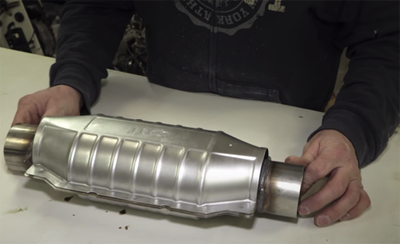U.S. Sens. Amy Klobuchar, D-MN, and Ron Wyden, D-OR, introduced legislation to combat the rise in catalytic converter theft.
The Preventing Auto Recycling Theft (PART) Act would ensure law enforcement can more effectively address these thefts by marking each converter with a traceable identification number and establishing converter theft as a criminal offense.
“Throughout the country, we’ve seen an alarming increase in catalytic converter theft. These converters can be easily taken from unattended cars but are difficult and expensive for car owners to replace,” said Klobuchar. “By making catalytic converter theft a criminal offense and ensuring each converter can be easily tracked, our legislation would provide law enforcement officers with the tools and resources they need to crack down on these crimes.”
“The theft of catalytic converters hurts the pocketbooks of working families and small business owners already struggling with rising costs,” said Wyden. “By strengthening local law enforcement’s ability to locate stolen car parts, we will be one step closer in the fight to end catalytic converter theft.”
Catalytic converters are used to reduce the potency of toxic emissions from an internal combustion engine and required for vehicle compliance with the Clean Air Act. According to the National Insurance Crime Bureau, catalytic converter thefts rose by more than 325% from 2019 to 2020.
Replacing these parts imposes significant financial costs to vehicle owners, often between $500 to $2,300, and can even result in a total loss to the vehicle.
The PART Act would:
- Require new vehicles to have a Vehicle Identification number (VIN) stamped onto the converter to allow law enforcement officers to link stolen parts to the vehicle from which they originate
- Create a grant program through which entities can stamp VIN numbers onto catalytic converters of existing vehicles
- Improve record keeping standards for purchasers of used catalytic converters
- Establish enforceability of laws around catalytic converter theft by codifying these crimes as a criminal offense
The bill has received the endorsement of the National Automobile Dealers Association, the American Truck Dealers (ATD), the American Trucking Associations (ATA), the Automotive Recyclers Association (ARA), the National Automatic Merchandising Association (NAMA), the National Independent Automobile Dealers Association (NIADA), the National Insurance Crime Bureau (NICB), the National RV Dealers Association (RVDA), the National Salvage Vehicle Reporting Program (NSVRP), NTEA — The Association for the Work Truck Industry, the American Car Rental Association (ACRA), the NAFA Fleet Management Association, the National Consumers League (NCL), the National Private Truck Council and the Truck Renting and Leasing Association (TRALA).
U.S. Rep. Jim Baird, R-IN, leads companion legislation in the House of Representatives.
“Dealers across Minnesota thank Sen. Klobuchar for introducing this common-sense bill to curb catalytic converter theft. The current patchwork of state laws combined with the lack of traceability has made catalytic converter theft an easy way for criminals to make quick cash,” said Scott Lambert, president of the Minnesota Automobile Dealers Association. “The PART Act will give teeth to law enforcement by making converters traceable to their original vehicle and by establishing federal criminal penalties for this theft.”
As a former prosecutor, Klobuchar has led efforts to prevent automobile-related crimes. In April, she convened a roundtable with Minnesota law enforcement leaders to discuss ways to crack down on violent carjacking crimes. The same month, she urged the U.S. Department of Justice to prioritize resources for state and local law enforcement to address increases in carjackings.
Source: Office of U.S. Sen. Amy Klobuchar












